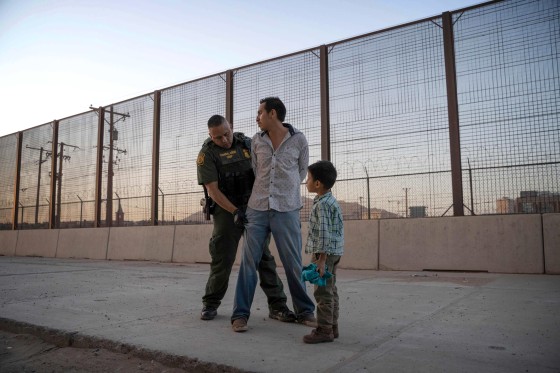Poor interagency communication and management decisions left the Department of Health and Human Services unprepared for caring for and reunifying the thousands of migrant children separated from their families under President Donald Trump’s "zero tolerance" policy, according to a government watchdog report released Thursday.
"HHS was not responsible for separating families, but HHS's inadequate communication, management, and planning made the situation worse for many separated children," the Department of Health and Human Services Office of Inspector General wrote in the report.
Those issues impeded the agency's planning and response efforts when dealing with the large-scale separation of migrant children from their families, Ann Maxwell, the assistant inspector general for evaluation and inspections, said in a news teleconference announcing the report Thursday morning.
The report said a lack of preparation for the policy hurt the agency's ability to identify, care for and later reunify separated children. Facilities caring for the migrant children "faced significant operational challenges at every stage of reunification, causing additional stress to children," the report said.
Some agency staff told the inspector general they felt there was an organizational culture that "discouraged putting potentially controversial in writing," the report said.
While Customs and Border Protection separated migrant families entering the United States, HHS oversees caring for unaccompanied or separated children after they leave CBP custody.
HHS was not notified of the "zero tolerance" policy in advance because interagency channels for coordinating immigration policies across departments were not used, the report said. But key senior officials in the department also "did not act on staff's repeated warnings that family separations were occurring and might increase," the report said.
Because the agency lacked enough bed space, it was not always able to place separated children in its facilities within 72-hour window required by law, the inspector general said. The agency also struggled to identify separated children from children who came alone "because no procedures or systems had been established to track separated families across HHS and DHS for later reunification," the report said.
The government watchdog said the agency has taken steps to improve the tracking of separated children and their placement, but those procedures remain "vulnerable to error."
HHS' Administration for Children and Families said in a statement following the report it was "mindful of the continued need to closely examine its policies and procedures and appreciates the on-going feedback and recommendations it has received from the Inspector General, Congress, grantees, advocates, and other stakeholders."
"As noted in the report, ORR is already taking steps toward implementing recommended changes that are within its statutory authorities," the statement said.
"The important work happening in each of the facilities and programs in the ORR network around the country — work ORR has done successfully since 2003 — takes an experienced team of competent, hardworking men and women dedicated to the welfare of the children," the statement said. "We treat the children in our care with dignity and respect, and deliver services to them in a compassionate and organized manner while we work expeditiously to unify each one with a suitable sponsor."
The statement added the agency will continue to work with DHS in a way that "prioritizes child welfare while attending to public safety and remains committed to providing technical assistance to its interagency partners on the child welfare impacts of immigration enforcement policy options when possible."
Maxwell said the inspector general's office interviewed hundreds of staff as well as senior officials, reviewed thousands of documents and conducted site visits at 45 care provider facilities in states including Arizona, California, Florida, Illinois, Maryland, New York, Oregon, Texas, Virginia and Washington.
The report recommended the agency pursue agreements with DHS and the Department of Justice to improve information sharing, improve communication with care facilities, that it further improve its ability to identify separated children and take steps to ensure children’s interests were prioritized.
The Trump administration systematically separated thousands of migrant children from their parents until June of 2018, when Trump signed an executive order effectively ending the policy and a federal judge ordered all the families to be reunited. The policy drew international and bipartisan outrage as images and audio of crying children and their parents spread around the world.
The American Civil Liberties Union, which has challenged the policy, said in October that an additional 1,500 children were separated than previously disclosed, bringing the tally to more than 4,000 from the roughly 2,700 children previously known to have been separated that year.
The civil rights group has said some children have continued to be separated for reasons as minor as a parent having a traffic citation.
During the news teleconference, Maxwell said a Dec. 2019 filing in that case said about 1,000 separations had happened since the June 2018 order.
In January of 2019, a previous report from the HHS inspector general found thousands more immigrant children were separated from their parents under the Trump administration than previously reported and that the total number of children separated was unknown.
Government watchdogs have published reports detailing multiple failures of the policy, including that the Department of Homeland Security lacked the technology to track the families and was unprepared for the scope of the policy.

